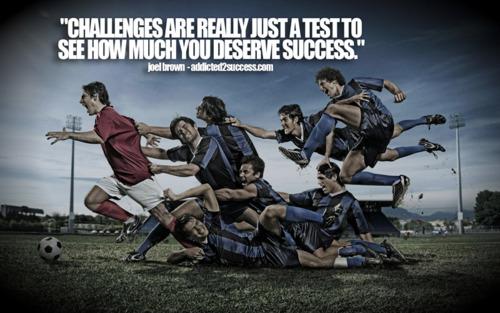Success Advice
Here’s A Great Strategic Plan for Overcoming Any Challenge

Human beings are pleasure-seeking, change-avoiding creatures of habit.
Our minds are geared toward taking path of least resistance; i.e., the easy way. There is a lot of logic and good sense in that. However, life is full of challenges and hard stuff you just gotta do. It is unequivocally impossible to avoid challenges, and it would be remiss of us to try.
Challenge is vital for personal growth; because all the magic happens just outside your comfort zone; because the achievement experienced is proportionate to the challenge surmounted.
There is a general awareness and acceptance of the idea that pushing through challenges makes us stronger, smarter, more evolved and skilled individuals. But we really struggle to embrace challenge with open arms and to mentally push ourselves through the hard times. It is an absolute truism that the only real barrier is the one that exists in your mind.
We are all limited by our mental baggage; fear, doubt, all the useless unhelpful beliefs we carry with us into our future that limits our potential. Those, my friends, are our Mind Monkeys. And its time to get those nasty little blighters off our backs, and out of our heads.
The greatest crime in the world is not developing your potential. When you do what you do best, you are helping not only yourself, but the world.” – Roger Williams
I’ll let you in on a little secret. I am a coaching psychologist and corporate trainer, I am passionate about my career and I am good at it. But for many years I had an internal ‘I hate sales’ mantra going on, and this limited my ability to achieve my professional goal of enriching as many lives as I could.
Because lets face it, without an ability to create business relationships and sell yourself and your services, you severely hobble your chance of succeeding professionally.
So I recognised that I needed to beat that monkey and master the consultative sales process. Here is a strategic plan of how I did it, and you can do it too.
1. Look your monkey in the eye
As any Psychologist will tell you, insight is an imperative precursor to change. After all, we cannot change what we do not accept. It is therefore a fundamental necessity that we do as Sun Tzu said in the Art of War, and ‘Know thy self, know thy enemy’. Spend some time in reflection on the following points and get to know your monkey well.
- What is the focus of your challenging situation? Define the mental challenge you’re in. Is it sales, dealing with confrontation, staying committed, saying No? Name that monkey!
- Why exactly is this situation challenging? This is about identifying the emotions and expectations that are linked with the challenge. Generally it comes down to the specific fears and doubts we hold due to our old thinking patterns. Dig deep and be honest.
- How does this challenge affect you? Fear and doubt unmanaged result in avoidance, otherwise known as procrastination! So identify how this avoidance and procrastination affects the outcomes you get.

2. Create your monkey-beating strategic plan
Once you know your monkey, you can start to develop a plan that moves you forward. This plan helps you to stay focused on why working through the challenge is important to you and exactly what you need to do on a daily, weekly and monthly basis in order to set yourself on a failsafe path of accomplishment. It also identifies the resources and implementation strategies needed, and the accountability measures needed to stay on track.
- Objectives & timeframe. Keep in mind that the focus of this plan is overcoming a challenge and a psychological barrier; getting the monkey off your back so to speak. So the objectives should reflect that. It should be about personal growth rather than material gain.
- Action plan. The action plan is a breakdown of exactly what you are going to do on a regular basis in order to achieve the objective. Jeff Olson used the term ‘simple daily disciplines’ in his book The Slight Edge, and explained that the difference between great success and massive failure lies not in one-off monumental events, but in the tiny almost insignificant decisions and behaviours we engage in on a daily basis and which compound over time. You need to identify two elements in your action plan:
- Skill development. What are the practical abilities and skills you need to improve that are relevant to your challenge?
-
- Thinking & Emotions. What are the thinking and emotional strategies you will employ in order to overcome the fear and doubt associated with your challenge?
3. Apply the plan diligently
Of course, even the best laid plan is only as good as the action that follows it. So the final phase is to ensure you get yourself in a steady rhythm of daily action.
- Mindset. Adopt a mindset of diligence and discipline. ‘I do it til its done’. Stop stuffing around and procrastinating, and fully commit to the goal. Do the work, and you will overcome the challenge. Tell yourself to do it, and don’t move on to the easy stuff until the daily task is done.
- Routine. Know exactly when and where you will be enacting your plan. Remember we are creatures of habit, so making the tasks a part of your normal routine makes it so much easier to follow through with and dramatically increases your chance of success.
- Accountability. The difficulty with working on personal goals is that we are often not accountable to anyone. So overcome this by setting up a tracking method that records the tasks achieved on a daily basis and marks your progress over time.
Many years ago I decided to move into a training role specifically because I had quite a fear of public speaking. I recognised speaking as such a useful and versatile skill that I thought it was worth mastering. So I took on a training role (before I really had the confidence to do it!), and had about six months of uncomfortableness and self-doubt while riding a really steep learning curve.
And then I got to the other side. Presenting and training is now a strength, and something I highly enjoy. My boss and mentor had a wonderful phrase – she called it Immersion Therapy. You simply keep doing it until hard becomes easy. So if you want to take control of your life, if you want to be free of your mind monkeys, that’s all you gotta do. Just keep at it until hard becomes easy.
It takes a strong person to put themselves in the way of challenge. But it is in surmounting the challenge that we find the benefits gained vastly outweigh perils undertaken.
“Courage is not the absence of fear, but rather the judgement that something is more important than fear; The brave may not live forever but the cautious do not live at all” – Meg Cabot
So go out there and face your monkeys; you might just find they’re not that scary after all.
Business
Why Smart Entrepreneurs Are Quietly Buying Gold and Silver
When stocks, property, and cash move together, smart business owners turn to one asset that plays by different rules.

You’ve built your business from the ground up. You know what it takes to create value, manage risk, and grow wealth. But here’s something that might surprise you: some of the most successful entrepreneurs are quietly adding physical gold and silver to their portfolios. (more…)
Business
The Simple Security Stack Every Online Business Needs
Most small businesses are exposed online without realising it. This simple protection stack keeps costs low and risks lower.

Running a business online brings speed and reach, but it also brings risk. Data moves fast. Payments travel across borders. Teams log in from homes, cafés, and airports. (more…)
Business
If Your Business Internet Keeps Letting You Down, Read This
From smoother operations to better security, dedicated internet access is quietly powering today’s high-performing businesses.

Today, a dependable internet service is the bedrock for uninterrupted business operations. Many organizations rely on stable online connections for communication, data transfer, and customer interaction. (more…)
Did You Know
How Skilled Migrants Are Building Successful Careers After Moving Countries
Behind every successful skilled migrant career is a mix of resilience, strategy, and navigating systems built for locals.

Moving to a new country for work is exciting, but it can also be unnerving. Skilled migrants leave behind familiar systems, networks, and support to pursue better job opportunities and a better future for their families. (more…)
-

 News3 weeks ago
News3 weeks agoBrandon Willington Builds 7-Figure Business by Ignoring Almost Everything
-

 Health & Fitness4 weeks ago
Health & Fitness4 weeks agoWhat Minimalism Actually Means for Your Wellness Choices
-

 Did You Know4 weeks ago
Did You Know4 weeks agoWhy Most Online Courses Fail and How to Fix Them
-

 Business4 weeks ago
Business4 weeks agoIf Your Business Internet Keeps Letting You Down, Read This
-

 Business2 weeks ago
Business2 weeks agoEntrepreneur’s Guide to Pay Stubs: Why Freelancers and Small Business Owners Need a Smart Generator
-

 Business2 weeks ago
Business2 weeks agoThe Salary Shift Giving UK Employers An Unexpected Edge
-

 Scale Your Business2 weeks ago
Scale Your Business2 weeks ago5 Real Ways to Grow Your User Base Fast
-

 Business2 weeks ago
Business2 weeks agoThe Simple Security Stack Every Online Business Needs





























7 Comments